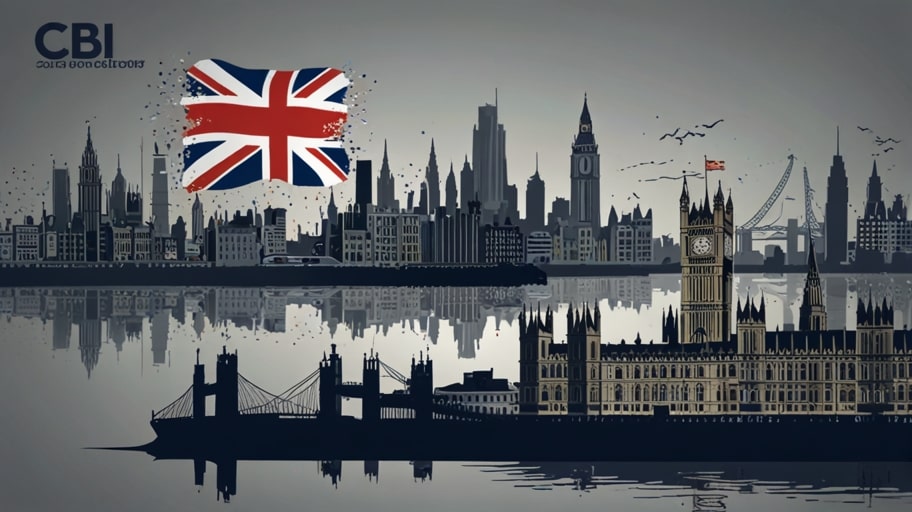
CBI Warns of Economic Stagnation Amid Global and Domestic Pressures
The UK economy is preparing to endure a tough time as the Confederation of British Industry (CBI) has dramatically reduced its 2025 and 2026 growth forecasts. New tariffs imposed by US President Donald Trump and hikes in internal payroll taxes are becoming massive headwinds that are jeopardising business confidence and investment. The CBI cautions that such pressures may hamper economic growth, and growth is now likely to be much less than many had been hoping.
The Squeeze is on the Manufacturing Sector
The effects of the Trump tariff have been a blow to UK manufacturers, as 60 percent of them surveyed by Make UK and BDO anticipate negativity. Just a quarter of them are looking to invest in the US, which indicates a withdrawal from expansion. The high cost of energy and inflation will worsen the situation, as manufacturing is expected to decline by 0.2 percent by 2025.
Employment Market Shows Signs of Strain
The labor market is declining, as job vacancies fell by 63,000 between March and May. According to official data, companies are reluctant to explore new staff or take on workers, which drives the unemployment rate to 4.6%, its highest in almost four years. The rate of wage growth has also tamed to 5.2 percent, which is above the rate of inflation but below expectations.
Tax Rises Hit Business Confidence
Rising taxes, especially an alteration in stamp duty rates, have hurt property recently, contributing to an economic contraction of 0.3% in April. Estate agents and conveyancing lawyers say things have ground to a halt. The services industry, an essential component of the UK economy, contracted by 0.4 percent, indicating a general financial prudence by businesses.
CBI Calls on Policy Re-think
The CBI underlines that the government is not doing much to provide short-term relief to growth in its latest Spending Review. While long-term benefits may be available, in the short term, difficulties prevail. The CBI economists forecast slow wage growth and a conservative Bank of England, with interest rates forecast to decline gradually to 3.5 percent towards the end of 2025.
Bioethanol Sector is at the Merger of Closure
The bioethanol industry is in dire straits after a UK-US tariff agreement eliminated a 19 percent tariff on imported US ethanol. Ensus, the company that owns a plant in Redcar, threatens to close very soon unless the government acts fast. Associated British Foods shares the same apprehension and indicates the risk that skilled employment faces as a result of this deal.
The lending soars in SMEs
In spite of the economic doom, small and medium-sized enterprises (SMEs) are getting a reprieve. In Q1 2025, lending to SMEs reached a three-year high of 4.6 billion, with a year-on-year rise of 14.0 percent. Challenger banks are now the order of the day as they make up 60 percent of lending, leaving less dependence on giants such as HSBC and Barclays.
Pubs cannot resist tax-laden pressure
New taxes and an increase in minimum wages are crumbling the hospitality industry. Insolvencies are on the increase, with 21 percent of UK pubs recorded to have negative net assets. Industry analysts are worried that such pressures may tip more establishments into a vulnerable position, endangering communities and job opportunities.
Mixed Barometers In Housing
There is some optimism in the UK housing market in June 2025. Buyers’ confidence is increasing, and the mortgage rates are becoming balanced, yet there are persistent problems for first-time buyers. With 1.8 million fixed-rate mortgages due to expire this year, brokers are experiencing a rise in demand to ensure that they provide homeowners with the best solutions in the complicated world of remortgaging.
Airbus Gives a Positive Signal
On Wednesday, Airbus will announce a new dividend strategy aimed at increasing shareholder payouts by maintaining a 30-50 percent payout ratio. The corporation has restated its cash conversion expectations and overall commitment to profitable development on all levels (commercial aircraft, helicopters, and defense) and gives one of the few red lights in UK business news.
India Trade Deal Progress
During the UK visit, the meeting today of the Union Commerce Minister Piyush Goyal and the UK Trade Minister reiterates the drive to arrive at the India-UK Free Trade Agreement. Those with Business Secretary Jonathan Reynolds and the heads of shipping, fintech, and manufacturing industries will focus on bolstering economic links, which could open up new opportunities to UK companies.
Inflation Holds Steady
The inflation rate still ran at 3.4 percent in May, as anticipated, although lower than the previous 3.5 percent in April. Core inflation fell as well to 3.5%. The numbers, released today, imply that the inflationary aspects of prices are coming to a halt, but companies are cautious about increasing prices being passed on to their operations and investment choices.
The Conservative attitude of the Bank of England
The Bank of England is still estimated to keep interest rates on hold in its meeting tomorrow, and traders believe the bank will only cut rates by two quarter points by the end of this year. This conservative philosophy results from the uncertainty caused by tensions in global trade and the fiscal policies in the United Kingdom, which add to the uncertainty in the economy facing businesses in the United Kingdom.
Policy Action Rally
Business coalitions are pressuring the government to act quickly to restore trust. The Institute Directors pointed out the chilling effect of the Employment Rights Bill: 49 percent of the leaders will be less willing to recruit staff because of the changes offered. Specific reforms must be undertaken to curb the increasing charges and regulatory expenses.
London Markets Are Falling behind
London’s financial markets are not doing well either, as businesses keep moving out in large numbers. According to Peel Hunt’s chief executive, a domestic lack of self-esteem is negating the UK’s international reputation. Cross-border investments already complicate the 8% drop of the US dollar in 2025.
Long-Term Optimism Persists
In spite of short-term hiccups, certain industries are resilient. FirstGroup’s good performance shows pockets of growth, with revenues rising by 7 percent to 1.37 billion. The CBI has high hopes that recovery will be achieved as long as businesses effectively emerge from the current storm through long-term policy actions.



 Bitcoin
Bitcoin  Ethereum
Ethereum  Tether
Tether  XRP
XRP  USDC
USDC  TRON
TRON  Lido Staked Ether
Lido Staked Ether  Cardano
Cardano  Avalanche
Avalanche  Toncoin
Toncoin  Solana
Solana